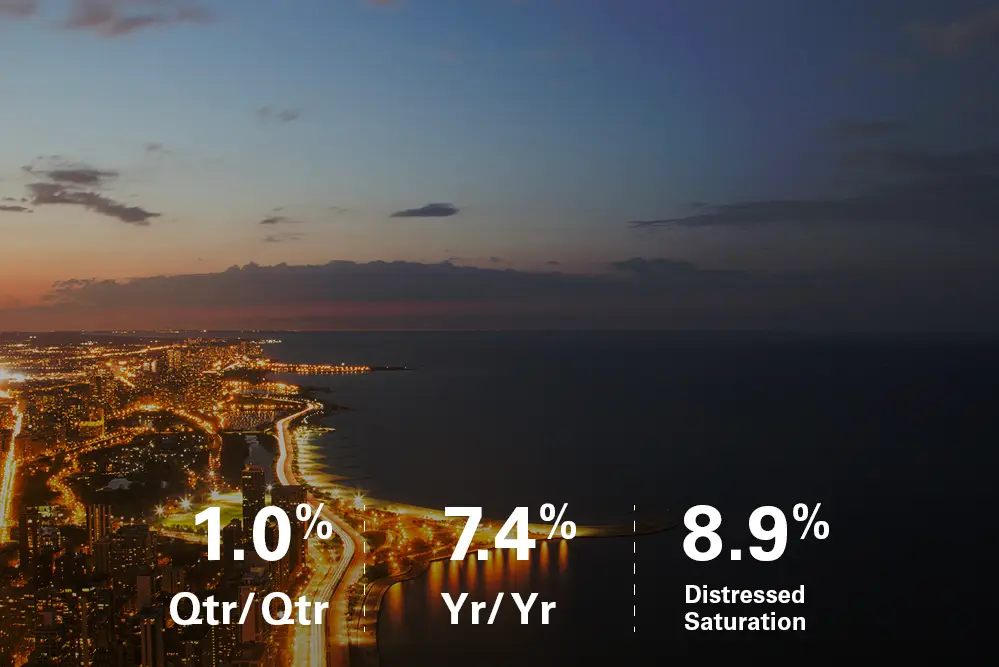Las Vegas remains nation’s highest-performing metro
National quarter-over-quarter (QoQ) home price growth grew 0.1 percent from December to 1 percent for January. National year-over-year growth (YoY) also grew 0.1 percent from December to 7.4 percent for January. All data reported is based upon Clear Capital’s patent-pending QoQ measurement, which uses the newest data to create timely indices in rolling-quarter intervals, significantly reducing multi-month lag time that may be experienced with other indices.
West Region
The West fell 0.1 percent to 1 percent QoQ growth for January. YoY growth fell 0.3 percent to 8.1 percent.
Las Vegas fell 0.2 percent to 2.06 percent QoQ growth, but remained the nation’s highest-performing metro. San Jose, California experienced a sharp drop but remained among the 10 highest-performing metros nationwide, falling 0.25 percent to 1.33 percent QoQ growth, and falling 1.16 percent to 13.8 percent YoY growth.
West metros among the 15 highest-performing metros nationwide:
– Oxnard, Calif. grew 0.26 percent to 1.45 percent QoQ growth
– Tucson, Ariz. grew 0.4 percent to 1.41 percent QoQ growth
– Fresno, Calif. grew 0.24 percent to 1.35 percent QoQ growth
– Phoenix, Ariz. grew 0.01 percent to 1.18 percent QoQ growth
West metros among the 15 lowest-performing metros nationwide:
– Los Angeles, Calif. fell 0.13 percent to 0.63 percent QoQ growth
– Portland, Ore. fell 0.1 percent to 0.58 percent QoQ growth
– Sacramento, Calif. fell 0.22 percent to 0.58 percent QoQ growth
– Seattle, Wash. fell 0.15 percent to 0.52 percent QoQ growth
– San Diego, Calif. grew 0.04 percent to 0.5 percent QoQ growth
Northeast Region
The Northeast showed signs of resilience to market slowdowns, growing 0.1 percent to 1.1 percent QoQ growth for January. However, YoY growth fell 0.2 percent to 8.1 percent.
Northeast metros among the 15 highest-performing metros nationwide: Providence, Rhode Island grew 0.1 percent to 1.59 percent QoQ growth, and New York grew 0.1 percent to 1.29 percent QoQ growth.
Northeast metros among the 15 lowest-performing metros nationwide:
– Pittsburgh, Pa. grew 0.16 percent to 0.55 percent QoQ growth, and grew 0.41 percent to 5.85 percent YoY growth
– Rochester, N.Y. fell 0.32 percent to 0.44 percent QoQ growth
– Hartford, Conn. was the nation’s lowest-performing metro and the first to experience negative growth in 2019, falling 0.32 percent to negative 0.11 percent QoQ growth
South Region
The South continued to experience growth, growing 0.1 percent to 0.9 percent QoQ growth for January.
South metros among the 15 highest-performing metros nationwide:
– San Antonio, Texas grew 0.69 percent to 1.96 percent QoQ growth
– Jacksonville, Fla. grew 0.04 percent to 1.33 percent QoQ growth
– Tampa, Fla. grew 0.23 percent to 1.24 percent QoQ growth
– New Orleans, La. fell 0.19 percent to 1.22 percent QoQ growth
South metros among the 15 lowest-performing metros nationwide:
– Richmond, Va. grew 0.15 percent to 0.64 percent QoQ growth
– Dallas, Texas fell 0.48 percent to 0.62 percent QoQ growth
– Virginia Beach, Va. fell 0.05 percent to 0.59 percent QoQ growth
– Houston, Texas fell 0.3 percent to 0.55 percent QoQ growth
– Washington, D.C. grew 0.09 to 0.5 percent QoQ growth
– Nashville, Tenn. grew 0.04 percent to 0.27 percent QoQ growth
Midwest Region
The Midwest improved slightly, growing 0.1 percent to 1 percent QoQ growth for January.
Midwest metros among the 15 highest-performing metros nationwide:
– Detroit, Mich. grew 0.05 percent to 1.49 percent QoQ growth
– Cleveland, Ohio grew 0.26 percent to 1.36 percent QoQ growth
– Columbus, Ohio grew 0.07 percent to 1.22 percent QoQ growth
Chicago was the only Midwest metro among the 15 lowest-performing metros nationwide, growing 0.07 percent to 0.62 percent QoQ growth.
About the Clear Capital Home Data Index™ (HDI™) Market Report
The Clear Capital HDI Market Report provides insights into market trends and other leading indices for the real estate market at the national and local levels. A critical difference in the value of Clear Capital’s HDI Market Report is the capability to provide more timely and granular reporting than nearly any other home price index provider.
Clear Capital’s HDI Methodology
– Generates the timeliest indices in patent pending, rolling quarter intervals that compare the most recent four months to the previous three months. The rolling quarters have no fixed start date and can be used to generate indices as data flows in, significantly reducing multi-month lag time that may be experienced with other indices.
– Includes both fair market and institutional (real estate owned) transactions, giving equal weight to all market transactions and identifying price tiers at a market specific level. By giving equal weight to all transactions, the HDI is truly representative of each unique market.
– Results from an address-level cascade create an index with the most granular, statistically significant market area available.
– Provides weighted repeat sales and price-per-square-foot index models that use multiple sale types, including single-family homes, multi-family homes and condominiums.
The information contained in this report is based on sources that are deemed to be reliable; however, no representation or warranty is made as to the accuracy, completeness, or fitness for any particular purpose of any information contained herein. This report is not intended as investment advice, and should not be viewed as any guarantee of value, condition, or other attribute.



